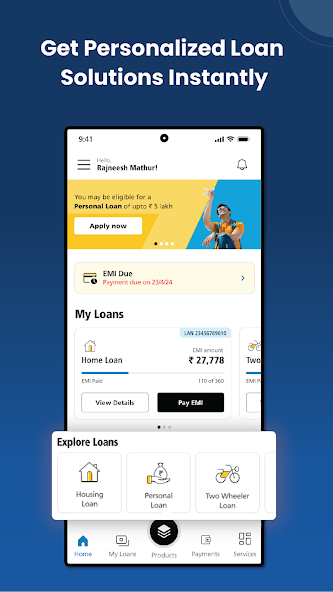In today’s financial climate, many individuals are exploring ways to manage expenses without falling into the trap of high-interest debt. A zero interest personal loan can be a viable option for short-term financial support without the burden of growing repayment costs. Especially when these loans come with no collateral, they offer flexibility and peace of mind. For those seeking affordable loans options, understanding the structure, eligibility, and benefits of these loans is essential.

Understanding Zero Interest Personal Loans
A zero interest personal loan is a type of borrowing where the lender does not charge any interest on the principal amount. Unlike traditional loans where borrowers are subject to monthly interest accumulation, these loans allow repayment of only the borrowed sum.
This financial product is particularly useful for individuals needing short-term funding for personal or emergency purposes. It can support medical bills, educational needs, or unexpected travel expenses without increasing the debt load through interest charges.
No Collateral: A Safer Lending Option
One of the biggest advantages of these loans is the no collateral requirement. Borrowers are not required to pledge any asset, such as a house or vehicle, to secure the loan. This reduces the risk for individuals who may not own high-value assets or are uncomfortable risking their property.
Unsecured loans are typically approved based on creditworthiness, income proof, and the ability to repay. However, for zero-interest loans, the focus is often on trust-based or limited-time offers through non-banking sources, cooperative societies, or special financial schemes.
Who Can Apply for a Zero Interest Personal Loan?
Zero interest loans are often available under specific conditions. While not open to every applicant, those who meet certain eligibility criteria can qualify. Here are a few general conditions:
- Age Requirement: Must be a legal adult (usually 18 or above).
- Steady Income: Proof of employment or a consistent income source may be required.
- Repayment Capacity: Lenders assess if the borrower can repay within the specified time.
- Purpose-Driven Applications: Sometimes the loan must be used for specific reasons, such as education or health.
Before applying, it’s essential to review all criteria to ensure you fall within the acceptable range of eligibility.
Benefits of Zero Interest Personal Loans
A zero interest personal loan brings several key advantages to those seeking affordable loans options:
1. No Interest Cost
The primary benefit is obvious—there’s no interest charged. You repay only what you borrow, reducing the financial pressure and overall cost.
2. No Asset Risk
Since there is no collateral involved, your personal property is not at risk in case of missed repayments.
3. Simple Repayment Structure
Most zero interest loans follow a fixed repayment schedule with no hidden charges, making budgeting easier for borrowers.
4. Ideal for Emergency Expenses
Whether it’s an unexpected medical bill or urgent repair, this type of loan can help bridge financial gaps quickly.
5. Opportunity for Credit Building
Even though the loan carries no interest, regular repayment on time can reflect positively on your credit profile, especially if reported to credit agencies.
Things to Consider Before Applying
Though appealing, a zero interest personal loan comes with certain aspects that need attention:
Limited Availability
These loans are often part of specific financial programs or offered for a limited time. Not every lender provides them, so access may be restricted.
Short Tenure
Zero interest loans generally have shorter repayment terms. Borrowers need to be prepared to repay within a few months to a year.
Fixed Loan Amount
You might not have the flexibility to borrow large sums, as these loans are usually capped at a low to moderate amount.
Documentation Requirements
While collateral isn’t needed, some form of verification such as identity proof, income statement, or purpose of loan may still be necessary.
How to Find Affordable Loan Options
If you are exploring zero interest options or looking for the best affordable loans options, consider the following steps:
- Research Trusted Financial Platforms: Look for community-based financial programs, credit unions, or verified lending portals that advertise zero interest offerings.
- Compare Loan Terms: Examine repayment periods, fees (if any), and late payment conditions.
- Avoid Hidden Clauses: Always read the fine print. Ensure that the “zero interest” claim isn’t only for a promotional period after which standard rates apply.
- Apply Through Reliable Channels: Never share personal or financial information on unsecured or unverified platforms.
Alternatives to Zero Interest Loans
In case you are unable to qualify for a zero interest loan, you may want to explore:
- Low Interest Personal Loans: Offered at competitive rates for those with strong credit.
- Salary Advance Schemes: Sometimes available through employers without interest or at nominal cost.
- Peer-to-Peer Lending: Can offer flexible terms depending on the arrangement between lender and borrower.
- Microfinance Solutions: Targeted toward small borrowings with accessible terms.
Each of these alternatives falls within the umbrella of affordable loans options and can be tailored to meet specific needs.
Responsible Borrowing is Key
While the idea of borrowing money without paying interest is attractive, responsible borrowing remains critical. Taking a loan—regardless of terms—requires a clear plan for repayment. Missing payments could result in penalties, affect your credit score, or make you ineligible for future financial help.
Before committing, ask yourself:
- Do I truly need this loan?
- Can I repay it within the agreed time?
- What happens if I miss a payment?
Conclusion
A zero interest personal loan with no collateral presents an excellent opportunity for those in need of quick, short-term financing. It supports emergency expenses, avoids debt accumulation, and fits well into the broader category of affordable loans options. By understanding the loan structure, benefits, and limitations, borrowers can make informed decisions and secure funding that suits their financial goals without added pressure.
As financial needs grow, exploring such responsible lending alternatives can make a significant difference. Always compare, evaluate, and proceed with a clear repayment plan.